Submitted:
02 June 2023
Posted:
05 June 2023
You are already at the latest version
Abstract
Keywords:
1. Introduction
2. Materials and Methods
2.1. Study area and data set
- Guidance systems (driver assistance, machine guidance, controlled traffic farming).
- Recording technologies, (soil mapping, soil moisture mapping, canopy mapping, yield mapping).
- Reacting technologies, (variable-rate irrigation and weeding and variable rate application of seeds, fertilizers, and pesticides).
- Productivity: for both periods considered (2014-2018 and 2019-2022), the two case studies are both considerably more productive than the median value of productivity referred to the sample of farms (greater than 40 hectares) producing durum wheat in Central Italy. Nevertheless, in the period 2019-2022, that is the period after the acquisition of the PA technology by farm A, both farms A and B slightly lost productivity compared to their levels in the previous period.
- Price of the durum wheat produced: in the period 2014-2018, farm A proves to possess a capacity to enhance production with a notable premium price compared to Central Italy (+16%) and farm B (+20%). This difference in price is due to the fact that farm A markets its product as seed wheat, a niche market in respect to the mainstream production of semolina wheat. In the period 2019-2022, post-PA adoption by farm A, the world changed drastically due to the double crisis (pandemic and the war in Ukraine) which, as we know, has led to a shock on the commodity market. Therefore, the surge in profit margins per hectare experienced by both case studies is due to the short-term economic prospects.
- Profitability (2014-2018): in the period 2014-2018, the operating income generated by every hectare of durum wheat produced by farm A is 69% higher than that of Central Italy and 70% higher than that of farm B. This evidence indicates a much greater cost efficiency experienced by farm A in its PA pre-adoption period with respect both to the median context and to farm B. On the other hand, during 2019-2022, both case studies show an operating income which increases considerably because of the supply shock within the European market. At this regard, it is interesting to note that the difference in competitiveness between the two case studies observed in the previous period has disappeared as indicated by the operating income settling on the same level for both the farms.
2.2. Economic analysis
- The profitability of durum wheat production performed by the PA adopting case study (farm A) has been assessed by comparing how the profitability indicators evolve before and after the adoption period (2014-2018 vs. 2019-2022).
- Besides, the incidence of Pats adoption in terms of IC results has been assessed comparing the indicators of the PA adopting farm (farm A) to that of the not-adopting farm (farm B).
-
Productivity
- ∘
- T/ha
-
Gross Profit (per hectare)
- ∘
- Revenues (RV) – Variable Costs (VC)
-
Gross profit Margin
- ∘
- (RV – VC)/RV
-
Operating profit (per hectare)
- ∘
- Gross Profit – (PA capital depreciation quota – land for rent quota – administrative and general expenses quota
-
Operating profit margin
- ∘
- Operating profit/RV
2.3. The nitrogen agronomic efficiency index (NAE)

3. Results and discussion
3.1. Economic results
3.2. Agronomic results
4. Conclusions
Author Contributions
Funding
Acknowledgments
Conflicts of Interest
References
- Laborde, D.; Martin, W.; Swinnen, J.; Vos, R. COVID-19 risks to global food security. Science 2020, 369, 500–502. [Google Scholar] [CrossRef] [PubMed]
- Hejazi, M.; Marchant, M. A. China’s evolving agricultural support policies. Choices 2017, 32, 1–7. [Google Scholar]
- Behnassi, M.; El Haiba, M. Implications of the Russia–Ukraine war for global food security. Nat. Hum. Behav. 2022, 6, 745–755. [Google Scholar] [CrossRef] [PubMed]
- Psaltopoulos, D. The Ukraine War and Food Security Crisis. Eurasian Journal of Agricultural Economics (EJAE) 2022, 2, 13–23. [Google Scholar]
- Izzeldin, M.; Muradoğlu, Y. G.; Pappas, V.; Petropoulou, A.; Sivaprasad, S. The impact of the Russian-Ukrainian war on global financial markets. Int. Rev. Financ. Anal. 2023, 87, 102598. [Google Scholar] [CrossRef]
- Arndt, C.; Diao, X.; Dorosh, P.; Pauw, K.; Thurlow, J. The Ukraine war and rising commodity prices: Implications for developing countries. Glob. Food Secur. 2023, 36, 100680. [Google Scholar] [CrossRef]
- Ben Hassen, T.; El Bilali, H. Impacts of the Russia-Ukraine war on global food security: towards more sustainable and resilient food systems? Foods 2022, 11, 2301. [Google Scholar] [CrossRef]
- Shahini, E.; Skura, E.; Sallaku, F.; Shahini, S. The supply shock in organic fertilizers for agriculture caused by the effect of Russia-Ukraine war. Scientific Horizons 2022, 2, 97–103. [Google Scholar] [CrossRef]
- Schnitkey, G.; Paulson, N.; Zulauf, C.; Swanson, K.; Colussi, J.; Baltz, J. Nitrogen fertilizer prices and supply in light of the Ukraine-Russia conflict. Farmdoc Dly. 2022, 12, 45. [Google Scholar]
- Alexander, P.; Arneth, A.; Henry, R.; Maire, J.; Rabin, S.; Rounsevell, M. D. High energy and fertilizer prices are more damaging than food export curtailment from Ukraine and Russia for food prices, health and the environment. Nature Food 2023, 4, 84–95. [Google Scholar] [CrossRef]
- Schieffer, J.; Dillon, C. The economic and environmental impacts of precision agriculture and interactions with agro-environmental policy. Precis. Agric. 2015, 16, 46–61. [Google Scholar] [CrossRef]
- Balafoutis, A.; Beck, B.; Fountas, S.; Vangeyte, J.; Wal, T.; Soto, I.; Gómez-Barbero, M.; Barnes, A.; Eory, V. Precision Agriculture Technologies Positively Contributing to GHG Emissions Mitigation, Farm Productivity and Economics. Sustainability 2017, 9, 1339. [Google Scholar] [CrossRef]
- Fabiani, S.; Vanino, S.; Napoli, R.; Zajíček, A.; Duffková, R.; Evangelou, E.; Nino, P. Assessment of the economic and environmental sustainability of Variable Rate Technology (VRT) application in different wheat intensive European agricultural areas. A Water energy food nexus approach. Environ. Sci. Policy 2020, 114, 366–376. [Google Scholar] [CrossRef]
- ITU; FAO. Digital excellence in agriculture in Europe and Central Asia: Good practices in the field of digital agriculture - Stocktaking report. Geneva, Switzerland. 2021. Available online: https://www.fao.org/3/cb6098en/cb6098en.pdf (accessed on 23 March 2023).
- Olson, K. Precision agriculture: Current economic and environmental issues. In Proceedings of the Sixth Joint Conference on Food, Agriculture, and the Environment, Minneapolis, MN, USA, 31 August–2 September 1998. [Google Scholar]
- Plant, R.; Pettygrove, G.; Reinert, W. Precision agriculture can increase profits and limit environmental impacts. Calif. Agr. 2000, 54, 66–71. [Google Scholar] [CrossRef]
- Zhang, N.; Wang, M.; Wang, N. Precision agriculture—a worldwide overview. Comput. Electron. Agric. 2002, 36, 113–132. [Google Scholar] [CrossRef]
- Bongiovanni, R.; Lowenberg-DeBoer, J. Precision agriculture and sustainability. Precis. Agric. 2004, 5, 359–387. [Google Scholar] [CrossRef]
- Meyer-Aurich, A.; Gandorfer, M.; Heißenhuber, A. Economic analysis of precision farming technologies at the farm level: Two german case studies. In Agricultural Systems: Economics, Technology, Diversity; Castelonge, O.W., Ed.; Nova Science Publishers: Hauppage, NY, USA, 2008; pp. 67–76. ISBN 978-1-60692-025-1. [Google Scholar]
- Vecchio, Y.; De Rosa, M.; Adinolfi, F.; Bartoli, L.; Masi, M. Adoption of precision farming tools: A context-related analysis. Land Use Policy 2020, 94, 104481. [Google Scholar] [CrossRef]
- Finco, A.; Bucci, G.; Belletti, M.; Bentivoglio, D. The economic results of investing in precision agriculture in durum wheat production: A case study in central Italy. Agronomy 2021, 11, 1520. [Google Scholar] [CrossRef]
- Gebbers, R.; Adamchuk, V. I. Precision agriculture and food security. Science 2010, 327, 828–831. [Google Scholar] [CrossRef]
- Domingo, J.; De Miguel, E.; Hurtado, B.; Métayer, N.; Bamière, L.; Pardon, L.; Bochu, J.; Pointereau, P.; Pellerin, S. Measures at farm level to reduce greenhouse gas emissions from EU agriculture. Notes. Policy Dep. B Struct. Cohes. Policies. 2014, 10, 4922. [Google Scholar]
- Higgins, S.; Schellberg, J.; Bailey, J. S. Improving productivity and increasing the efficiency of soil nutrient management on grassland farms in the UK and Ireland using precision agriculture technology. Eur. J. Agron. 2019, 106, 67–74. [Google Scholar] [CrossRef]
- Soto Embodas, I.; Barnes, A.; Balafoutis, A.; Beck, B.; Sanchez Fernandez, B.; Vangeyte, J.; Fountas, S.; Van Der Wal, T.; Eory, V.; Gomez Barbero, M. The Contribution of Precision Agriculture Technologies to Farm Productivity and the Mitigation of Greenhouse Gas Emissions in the EU; Publications Office of the European Union: Luxembourg, 2019. [Google Scholar]
- Franco, C.; Pedersen, S. M.; Papaharalampos, H.; Ørum, J. E. The value of precision for image-based decision support in weed management. Precis. Agric. 2017, 18, 366–382. [Google Scholar] [CrossRef]
- Monteiro, A.; Santos, S. Sustainable approach to weed management: The role of precision weed management. Agronomy 2022, 12, 118. [Google Scholar] [CrossRef]
- Diacono, M.; Rubino, P.; Montemurro, F. Precision nitrogen management of wheat. A review. Agron. Sustain. Dev. 2013, 33, 219–241. [Google Scholar] [CrossRef]
- Patrício, D. I.; Rieder, R. Computer vision and artificial intelligence in precision agriculture for grain crops: A systematic review. Comput. Electron. Agric. 2018, 153, 69–81. [Google Scholar] [CrossRef]
- Toscano, P.; Castrignanò, A.; Di Gennaro, S. F.; Vonella, A. V.; Ventrella, D.; Matese, A. A precision agriculture approach for durum wheat yield assessment using remote sensing data and yield mapping. Agronomy 2019, 9, 437. [Google Scholar] [CrossRef]
- Leukel, J.; Zimpel, T.; Stumpe, C. Machine learning technology for early prediction of grain yield at the field scale: A systematic review. Comput. Electron. Agric. 2023, 207, 107721. [Google Scholar] [CrossRef]
- Tanabe, R.; Matsui, T.; Tanaka, T. S. Winter wheat yield prediction using convolutional neural networks and UAV-based multispectral imagery. Field Crop. Res. 2023, 291, 108786. [Google Scholar] [CrossRef]
- Zou, R.; Zhang, Y.; Chen, J.; Li, J.; Dai, W.; Mu, S. Density estimation method of mature wheat based on point cloud segmentation and clustering. Comput. Electron. Agric. 2023, 205, 107626. [Google Scholar] [CrossRef]
- Godwin, R. J.; Richards, T. E.; Wood, G. A.; Welsh, J. P.; Knight, S. M. An economic analysis of the potential for precision farming in UK cereal production. Biosyst. Eng. 2003, 84, 533–545. [Google Scholar] [CrossRef]
- Pedersen, S. M.; Fountas, S.; Have, H.; Blackmore, B. S. Agricultural robots—system analysis and economic feasibility. Precis. Agric. 2006, 7, 295–308. [Google Scholar] [CrossRef]
- Robertson, M.; Carberry, P.; Brennan, L. The economic benefits of precision agriculture: case studies from Australian grain farms. Crop Pasture Sci. 2007, 60, 2012. [Google Scholar]
- Jensen, H. G.; Jacobsen, L. B.; Pedersen, S. M.; Tavella, E. Socioeconomic impact of widespread adoption of precision farming and controlled traffic systems in Denmark. Precis. Agric. 2012, 13, 661–677. [Google Scholar] [CrossRef]
- Pierpaoli, E.; Carli, G.; Pignatti, E.; Canavari, M. Drivers of precision agriculture technologies adoption: a literature review. Proc. Tec. 2013, 8, 61–69. [Google Scholar] [CrossRef]
- Mintert, J.R.; Widmar, D.; Langemeier, M.; Boehlje, M.; Erickson, B. The Challenges of Precision Agriculture: Is Big Data the Answer? 2016. Available online: https://ageconsearch.umn.edu/record/230057 (accessed on 30 March 2023).
- Bucci, G.; Bentivoglio, D.; Finco, A.; Belletti, M.; Bentivoglio, D. Exploring the impact of innovation adoption in agriculture: How and where Precision Agriculture Technologies can be suitable for the Italian farm system? IOP Conf. Series Earth Environ. Sci. 2019, 275, 012004. [Google Scholar] [CrossRef]
- Barnes, A.; De Soto, I.; Eory, V.; Beck, B.; Balafoutis, A.; Sánchez, B.; Vangeyte, J.; Fountas, S.; van der Wal, T.; Gómez-Barbero, M. Influencing factors and incentives on the intention to adopt precision agricultural technologies within arable farming systems. Environ. Sci. Policy 2019, 93, 66–74. [Google Scholar] [CrossRef]
- Deffontaines, L.; Mottes, C.; Della Rossa, P.; Lesueur-Jannoyer, M.; Cattan, P.; Le Bail, M. How farmers learn to change their weed management practices: Simple changes lead to system redesign in the French West Indies. Agric. Syst. 2020, 179, 102769. [Google Scholar] [CrossRef]
- Lavik, M. S.; Hardaker, J. B.; Lien, G.; Berge, T. W. A multi-attribute decision analysis of pest management strategies for Norwegian crop farmers. Agr. Syst. 2020, 178, 102741. [Google Scholar] [CrossRef]
- Autio, A.; Johansson, T.; Motaroki, L.; Minoia, P.; Pellikka, P. Constraints for adopting climate-smart agricultural practices among smallholder farmers in Southeast Kenya. Agr. Syst. 2021, 194, 103284. [Google Scholar] [CrossRef]
- Benitez-Altuna, F.; Trienekens, J.; Materia, V. C.; Bijman, J. Factors affecting the adoption of ecological intensification practices: A case study in vegetable production in Chile. Agr. Syst. 2021, 194, 103283. [Google Scholar] [CrossRef]
- Blasch, J.; van der Kroon, B.; van Beukering, P.; Munster, R.; Fabiani, S.; Nino, P.; Vanino, S. Farmer preferences for adopting precision farming technologies: a case study from Italy. Eur. Rev. Agri. Econ. 2022, 49, 33–81. [Google Scholar] [CrossRef]
- Basso, B.; Dumont, B.; Cammarano, D.; Pezzuolo, A.; Marinello, F.; Sartori, L. Environmental and Economic Benefits of Variable Rate Nitrogen Fertilization in a Nitrate Vulnerable Zone. Sci. Total Environ. 2016, 545, 227–235. [Google Scholar] [CrossRef]
- Colaço, A.F.; Molin, J.P. Variable rate fertilization in citrus: A long term study. Precis. Agric. 2017, 18, 169–191. [Google Scholar] [CrossRef]
- Schillaci, C.; Perego, A.; Valkama, E.; Märker, M.; Saia, S.; Veronesi, F.; Lipani, A.; Lombardo, L.; Tadiello, T.; Gamper, H.A.; et al. New Pedotransfer Approaches to Predict Soil Bulk Density Using WoSIS Soil Data and Environmentalcovariates in Mediterranean Agro-Ecosystems. Sci. Total Environ. 2021, 780, 146609. [Google Scholar] [CrossRef]
- Yin, R.K. Case study research: Design and methods. Thousand Oaks, CA: Sage. The Canadian Journal of Action Research 2009, 14, 69–71. [Google Scholar]
- Novyarni, N.; Ningsih, L. N. A. Comparative Analysis of Financial Ratios and Economic Value Added Methods in Assessing Company Financial Performance. Proceedings of the Annual International Conference on Accounting Research 2020, 137–142. [Google Scholar]
- Olson, K.; Westra, J. The Economics of Farm Management: A Global Perspective, 2nd ed.; Routledge: New York, 2022. [Google Scholar]
- Ali, A.; Haque, M. I. Ratio Analysis: A Comparative Study of National Petrochemicals Co. and Sahara Petrochemicals Co. of Saudi Arabia. International Journal of Management Academy 2014, 2, 53–61. [Google Scholar]
- Roberts, R.K.; English, B.C.; Larson, J.A.; Cochran, R.L.; Goodman, W.R.; Larkin, S.L.; Marra, M.C.; Martin, S.W.; Shurley, W.D.; Reeves, J.M. Adoption of Site-Specific Information and Variable-Rate Technologies in Cotton Precision Farming. J. Agric. Appl. Econ. 2004, 36, 143–158. [Google Scholar] [CrossRef]
- Tamirat, T.W.; Pedersen, S.M.; Lind, K.M. Farm and operator characteristics affecting adoption of precision agriculture in Denmark and Germany. Acta Agr. Scand. B-Soil Plant Sci. 2018, 68, 349–357. [Google Scholar] [CrossRef]
- Kernecker, M.; Knierim, A.; Wurbs, A.; Kraus, T.; Borges, F. Experience versus expectation: Farmers’ perceptions of smart farming technologies for cropping systems across Europe. Precis. Agric. 2020, 21, 34–50. [Google Scholar] [CrossRef]
- Charatsari, C.; Lioutas, E. D.; Papadaki-Klavdianou, A.; Michailidis, A.; Partalidou, M. Farm advisors amid the transition to Agriculture 4.0: Professional identity, conceptions of the future and future-specific competencies. Sociologia Ruralis 2022, 62, 335–362. [Google Scholar] [CrossRef]
- Allen, R.G.; Pereira, L.; Raes, D.; Smith, M. Crop Evapotranspiration-Guidelines for Computing Crop Water Requirements. In FAO Irrigation and Drainage Paper 56; FAO: Rome, Italy, 1998. [Google Scholar]
- Fiorentini, M.; Zenobi, S.; Orsini, R. Remote and Proximal Sensing Applications for Durum Wheat Nutritional Status Detection in Mediterranean Area. Agriculture 2021, 11, 39. [Google Scholar] [CrossRef]
- Orsini, R.; Basili, D.; Belletti, M.; Bentivoglio, D.; Bozzi, C.A.; Chiappini, S.; Conti, C.; Galli, A.; Giorgini, E.; Fiorentini, M.; et al. Setting of a precision farming robotic laboratory for cropping system sustainability and food safety and security: Preliminary results. IOP Conf. Series Earth Environ. Sci. 2019, 275, 01202. [Google Scholar] [CrossRef]
- Fiorentini, M.; Schillaci, C.; Denora, M.; Zenobi, S.; Deligios, P.; Orsini, R.; Santilocchi, R.; Perniola, M.; Montanarella, L.; Ledda, L. A machine learning modelling framework for Triticum turgidum subsp. durum Desf yield forecasting in Italy. Agron. J. 2022, 2023, 1–21. [Google Scholar]
- Denora, M.; Fiorentini, M.; Zenobi, S.; Deligios, P.A.; Orsini, R.; Ledda, L.; Perniola, M. Validation of rapid and low-cost approach for the delineation of zone management based on machine learning algorithms. Agronomy 2022, 12, 183. [Google Scholar] [CrossRef]
- Orsini, R.; Fiorentini, M.; Zenobi, S. Testing vegetation index categories as influenced by soil management and nitrogen fertilization in cereal based cropping systems. In Proceedings of the 2019 International IEEE Workshop on Metrology for Agriculture and Foresty, Portici, Italy, 24–26 October 2019. [Google Scholar]
- Orsini, R.; Fiorentini, M.; Zenobi, S. Evaluation of Soil Management Effect on Crop Productivity and Vegetation Indices Accuracy in Mediterranean Cereal-Based Cropping Systems. Sensors 2020, 20, 3383. [Google Scholar] [CrossRef] [PubMed]
- Pro, C.; Basili, D.; Notarstefano, V.; Belloni, A.; Fiorentini, M.; Zenobi, S.; Alia, S.; Vignini, A.; Orsini, R.; Giorgini, E. A spectroscopic approach to evaluate the effects of different soil tillage methods and nitrogen fertilization levels on the biochemical composition of durum wheat (Triticum turgidum subsp. durum) leaves and caryopses. Agriculture 2021, 11, 321. [Google Scholar] [CrossRef]
- Seddaiu, G.; Iocola, I.; Farina, R.; Orsini, R.; Iezzi, G.; Roggero, P.P. Long term effects of tillage practices and N fertilization in rainfed Mediterranean cropping systems: Durum wheat, sunflower and maize grain yield. Eur. J. Agron. 2016, 77, 166–178. [Google Scholar] [CrossRef]
- Abad, A.; Lloveras, J.; Michelena, A. Nitrogen Fertilization and Foliar Urea Effects on Durum Wheat Yield and Quality and on Residual Soil Nitrate in Irrigated Mediterranean Conditions. Field Crop. Res. 2004, 87, 257–269. [Google Scholar] [CrossRef]
- Rath, S.; Zamora-Re, M.; Graham, W.; Dukes, M.; Kaplan, D. Quantifying Nitrate Leaching to Groundwater from a Corn-Peanut Rotation under a Variety of Irrigation and Nutrient Management Practices in the Suwannee River Basin, Florida. Agr. Water Manage. 2021, 246, 106634. [Google Scholar] [CrossRef]
- Munch, J.C.; Velthof, G.L. Denitrification and agriculture. In Biology of the Nitrogen Cycle; Elsevier: Amsterdam, The Netherlands, 2007. [Google Scholar]
- Karpinski, I.; Schuler, J.; Müller, K. A New Approach to Support Site-Specific Farming and Economic Decision Making for Precision Agriculture in East Germany: The Heterogeneity Indicator. Outlook Agr. 2015, 44, 283–289. [Google Scholar] [CrossRef]
- Basso, B.; Fiorentino, C.; Cammarano, D.; Schulthess, U. Variable rate nitrogen fertilizer response in wheat using remote sensing. Precis. Agric. 2015, 17, 168–182. [Google Scholar] [CrossRef]
- Denora, M.; Amato, M.; Brunetti, G.; De Mastro, F.; Perniola, M. Geophysical field zoning for nitrogen fertilization in durum wheat (Triticum durum Desf.). PLoS ONE 2022, 17, e0267219. [Google Scholar] [CrossRef]
- Zhao, G.; Miao, Y.; Wang, H.; Su, M.; Fan, M.; Zhang, F.; Jiang, R.; Zhang, Z.; Liu, C.; Liu, P.; et al. A Preliminary Precision Rice Management System for Increasing Both Grain Yield and Nitrogen Use Efficiency. Field Crop. Res. 2013, 154, 23–30. [Google Scholar] [CrossRef]
- Argento, F.; Anken, T.; Abt, F.; Vogelsanger, E.; Walter, A.; Liebisch, F. Site-Specific Nitrogen Management in Winter Wheat Supported by Low-Altitude Remote Sensing and Soil Data. Precis. Agric. 2021, 22, 364–386. [Google Scholar] [CrossRef]
- Santaga, F.S.; Benincasa, P.; Toscano, P.; Antognelli, S.; Ranieri, E.; Vizzari, M. Simplified and Advanced Sentinel-2-Based Precision Nitrogen Management of Wheat. Agronomy 2021, 11, 1156. [Google Scholar] [CrossRef]
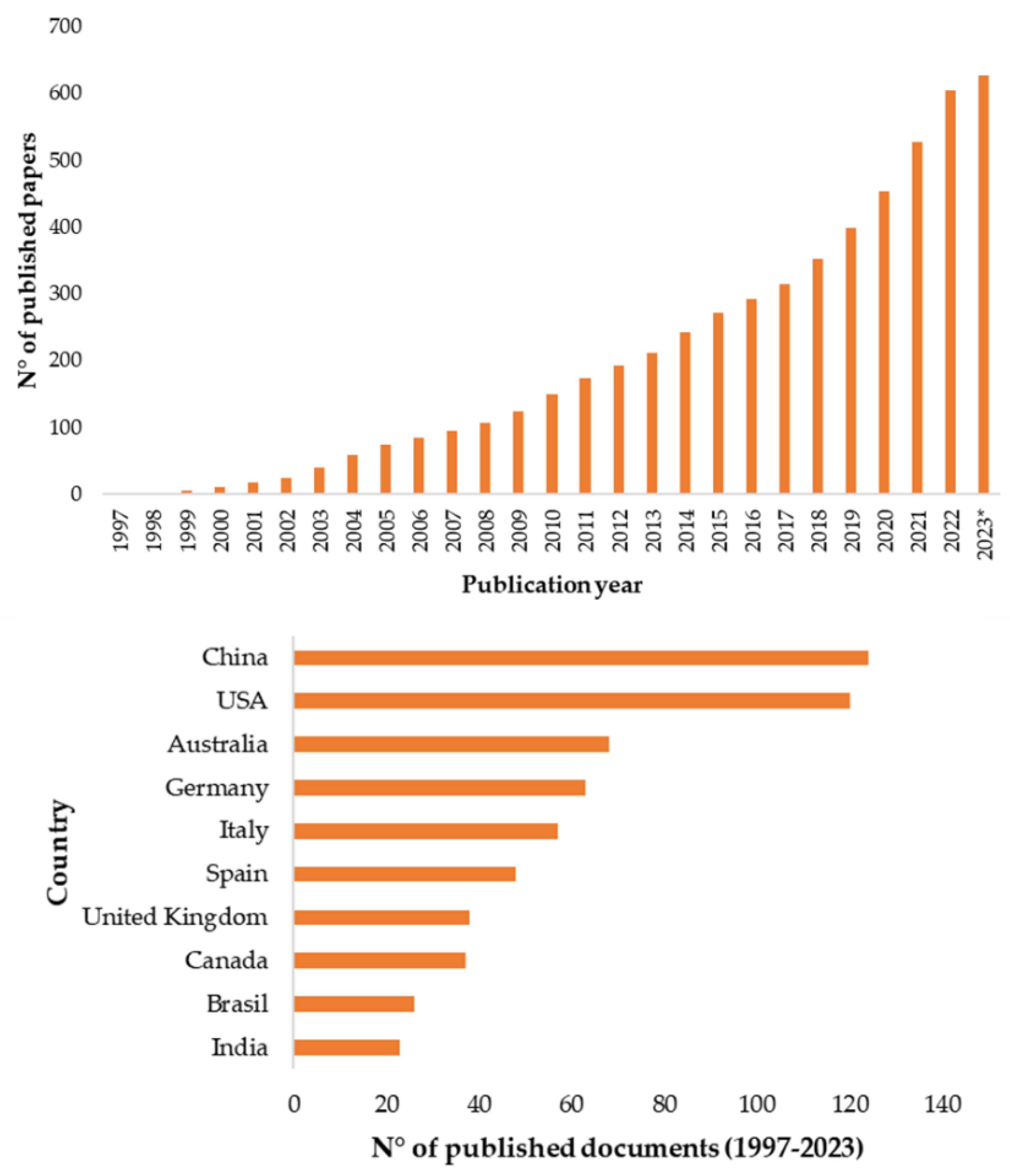
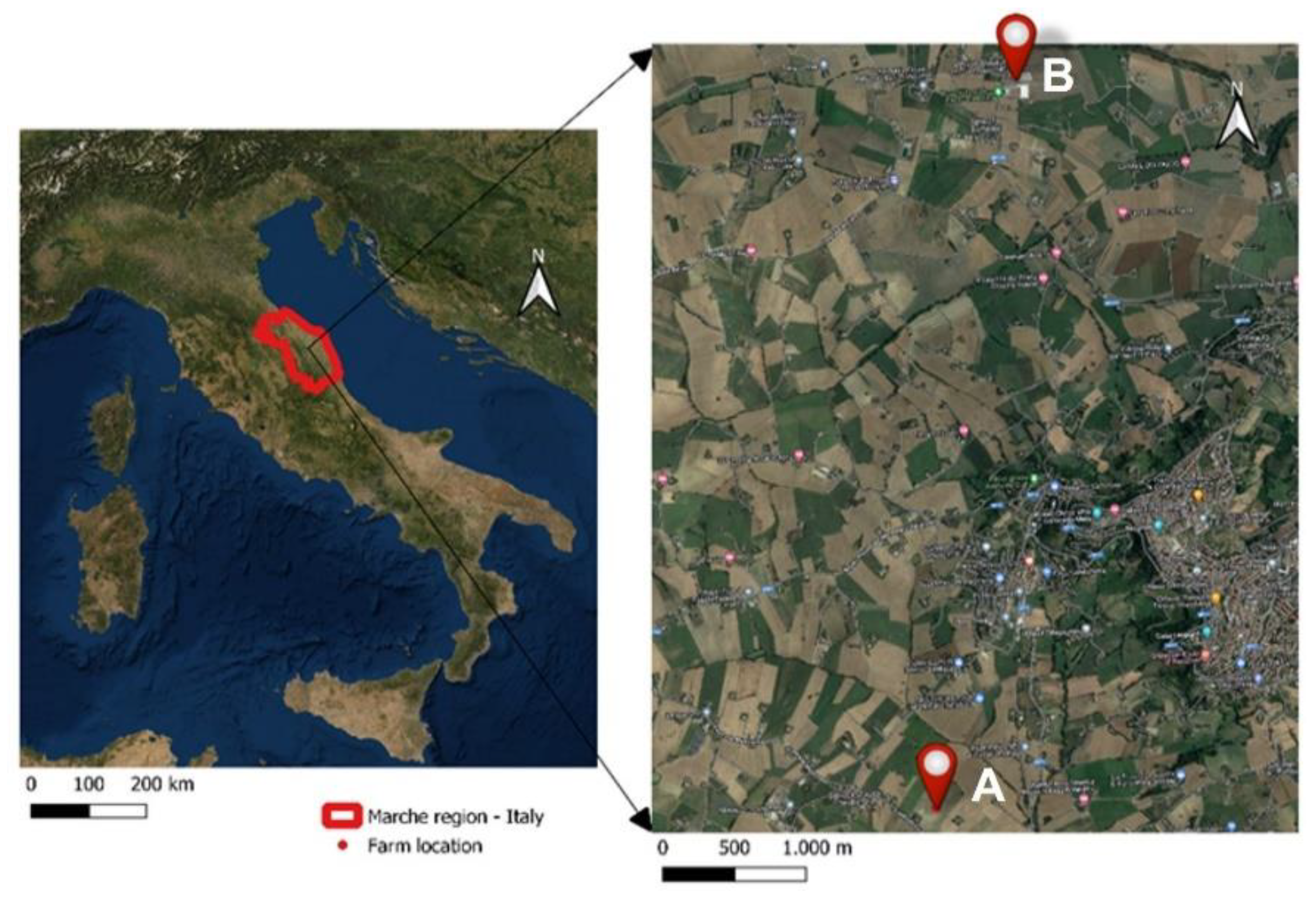
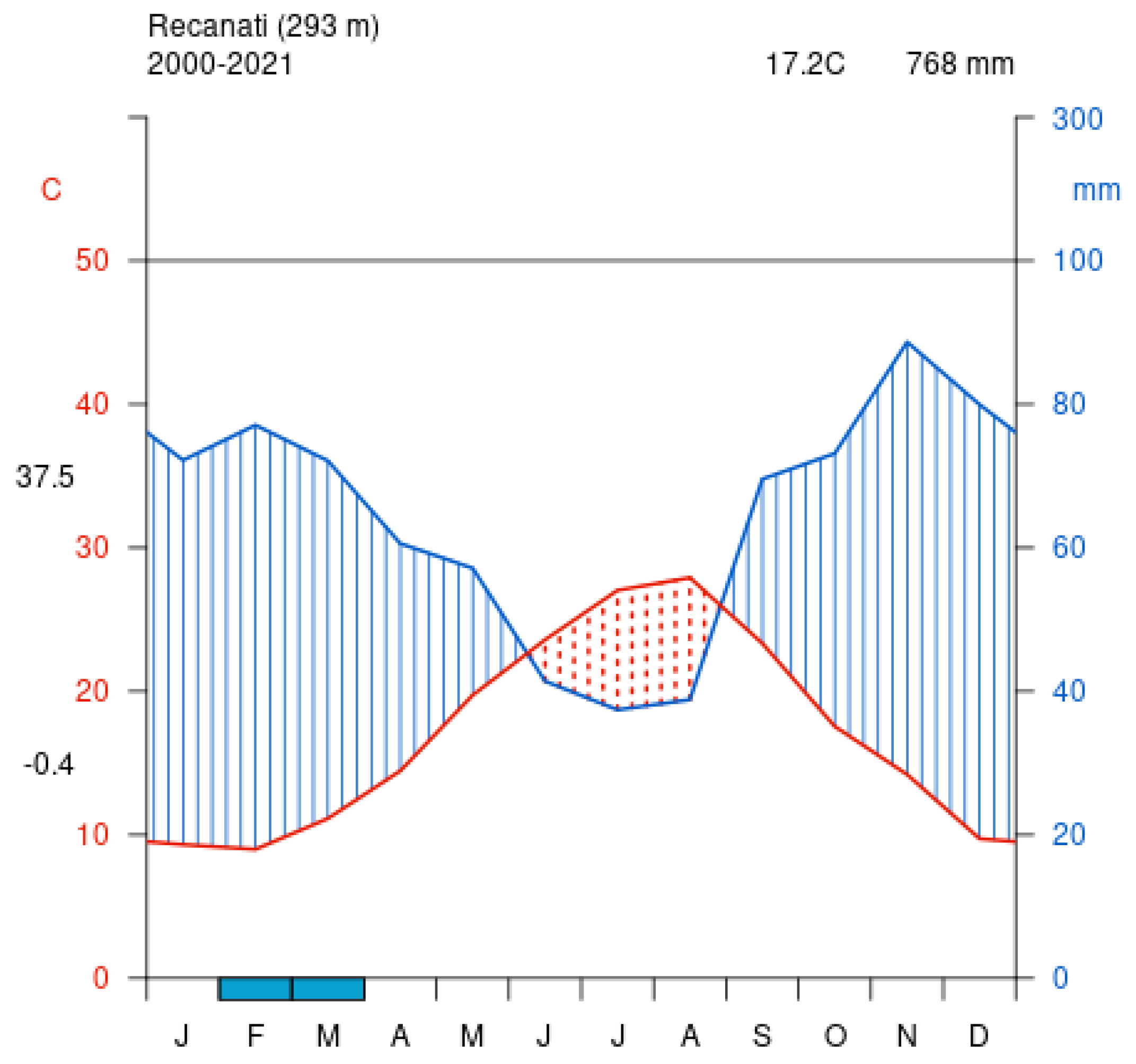
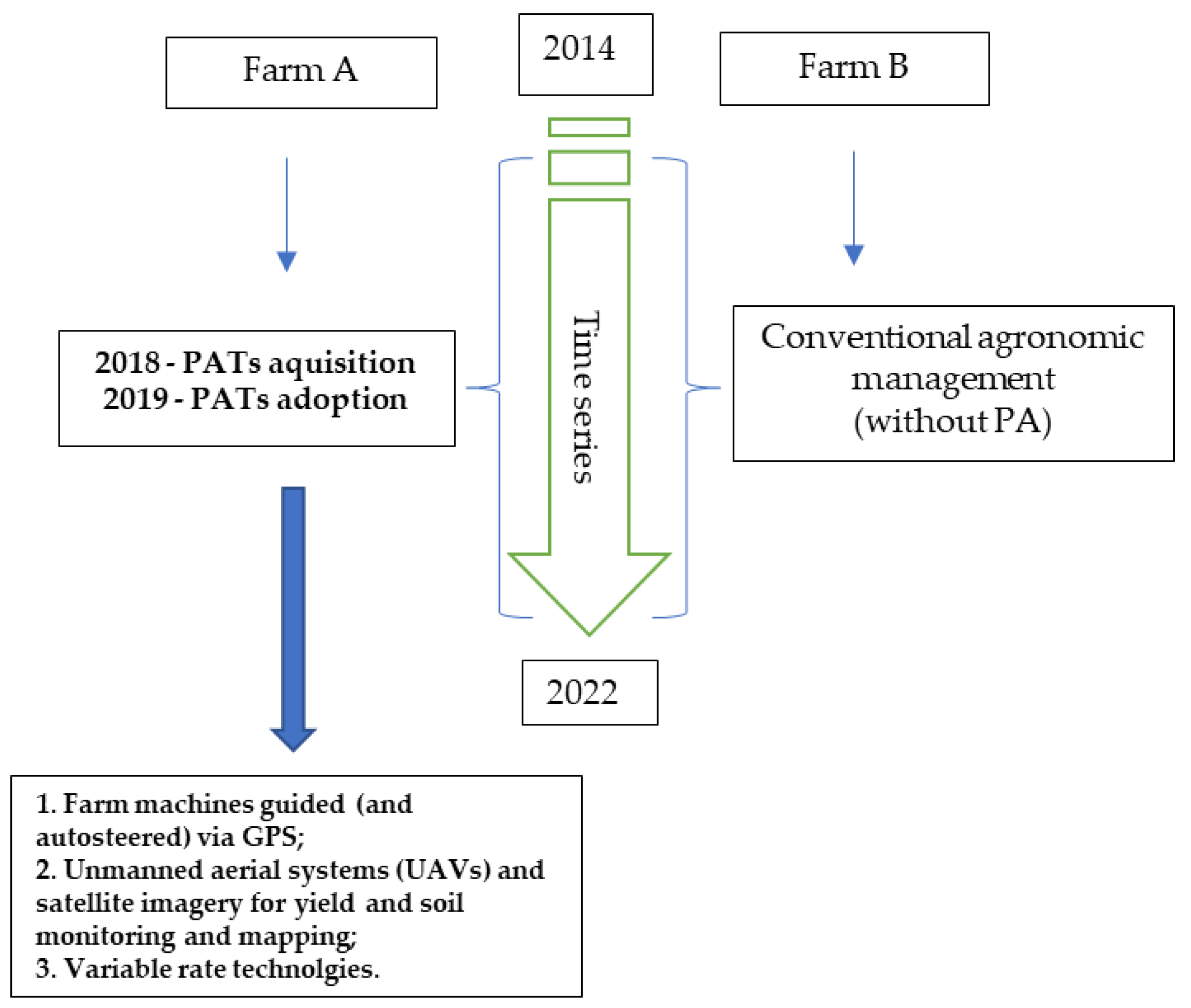
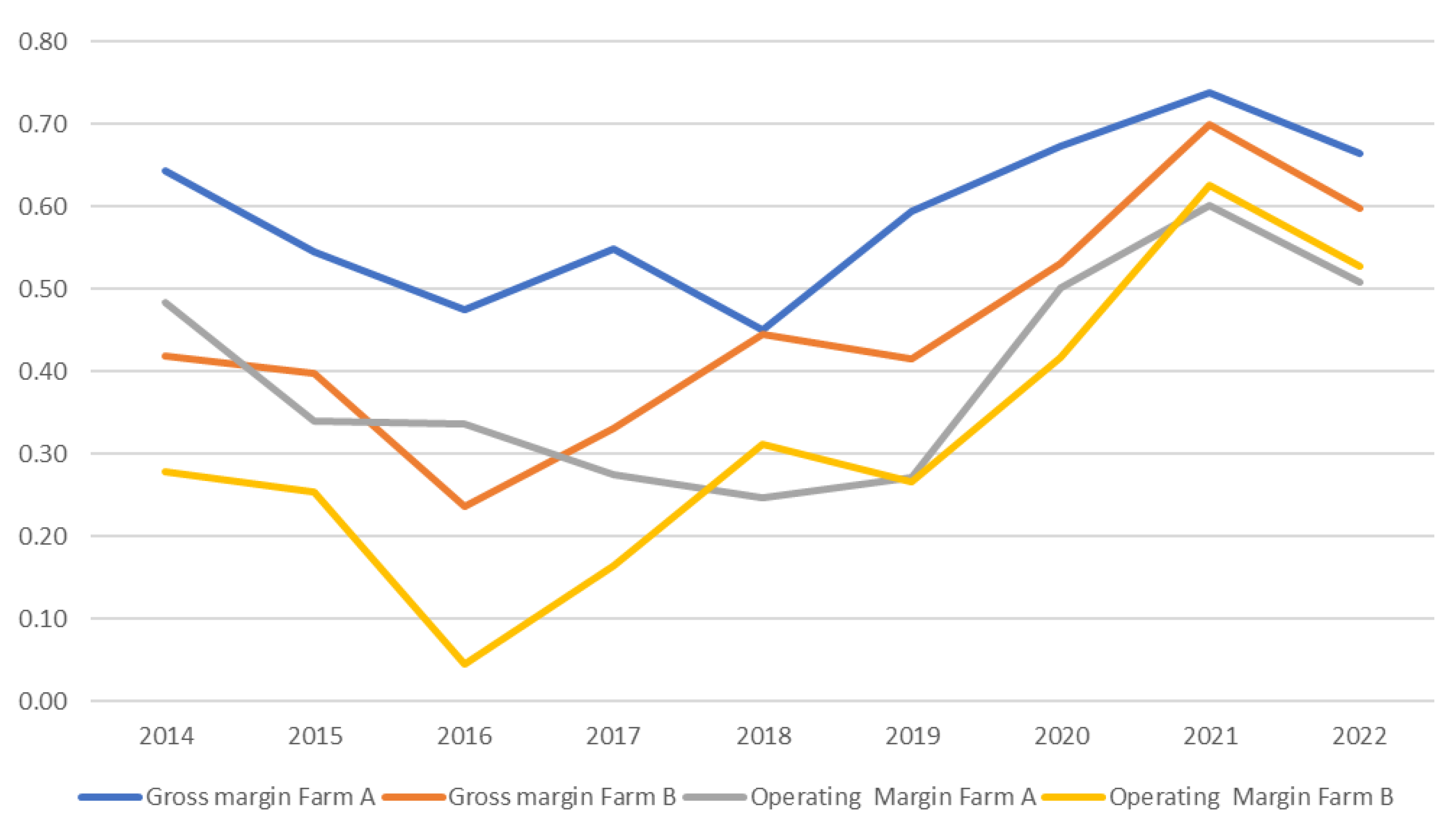
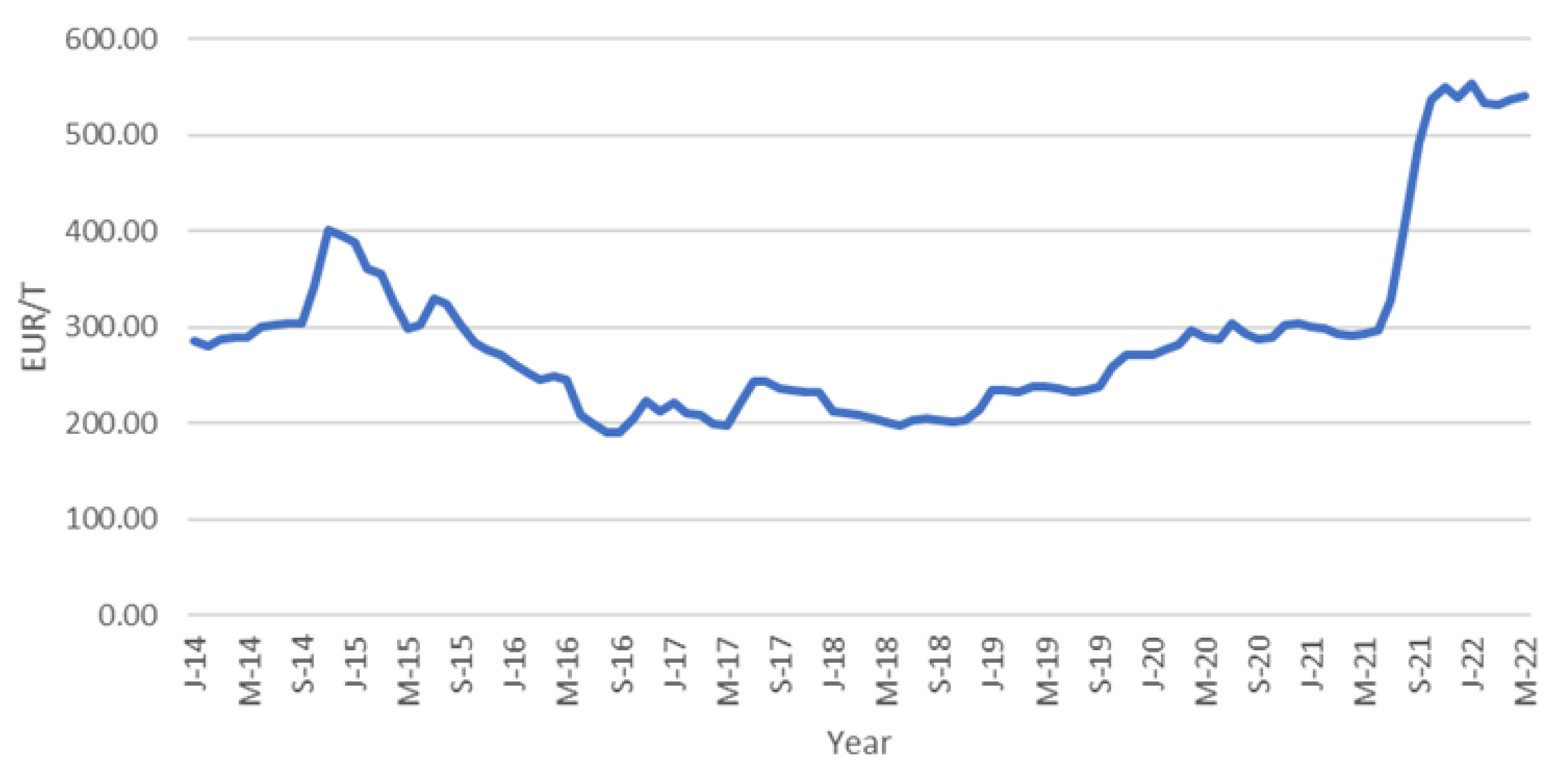
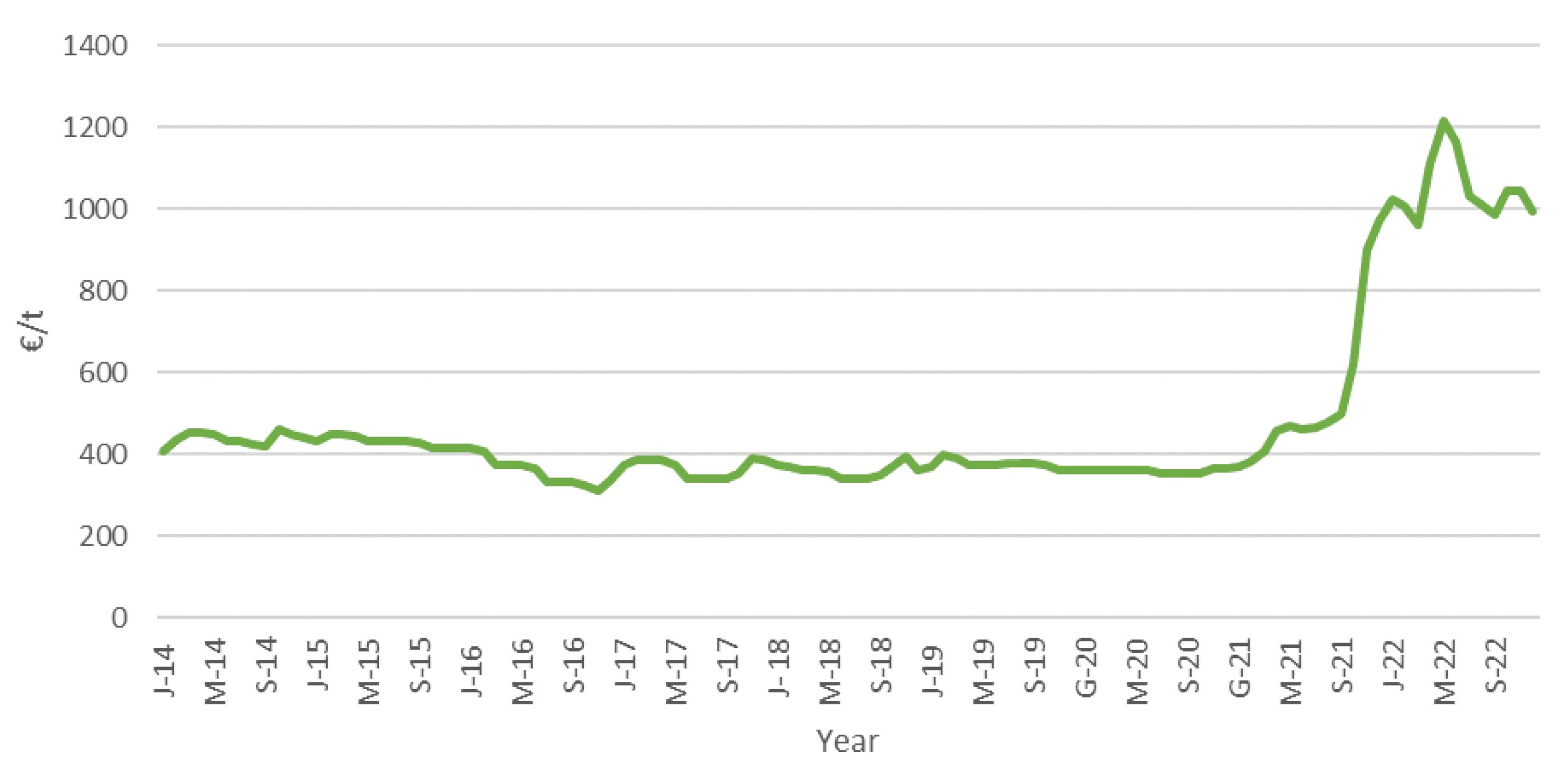
| UAA durum wheat | Average yield | Average yield index | Average durum wheat price | Average durum wheat price index | Gross profit | Gross profit index | Operating profit | Operating profit index | |
|---|---|---|---|---|---|---|---|---|---|
| ha | t/ha | €/t | €/ha | €/ha | |||||
| Central Italy farms > 40 ha (210-2018) | 15.2 | 4.7 | 1.00 | 222 | 1.00 | 478 | 1.00 | 295 | 1.00 |
| Farm A (2014-2018) | 87.6 | 5.66 | 1.18 | 257 | 1.16 | 776 | 1.62 | 498 | 1.69 |
| Farm B (2014-2018) | 54.2 | 6.2 | 1.31 | 213 | 0.96 | 494 | 1.03 | 294 | 0.99 |
| Farm A (2019-2022) | 103.0 | 5.4 | 1.14 | 392 | 1.76 | 1,401 | 2.93 | 1,019 | 3.45 |
| Farm B (2018-2022) | 57.0 | 5.9 | 1.26 | 369 | 1.66 | 1,275 | 2.67 | 1,075 | 3.64 |
| Farm A | |
| Field Activities | Period |
| Ploughing (40 cm) | October |
| Harrowing | November |
| Sowing | November |
| Pest control: Azoxystrobin, Cyproconazole | March |
| 1st N fertilization – VRT1 | March |
| 2nd N fertilization – VRT1 | April |
| Harvest | July |
| Farm B | |
| Field Activities | Period |
| Chisel (25 cm) | October |
| Harrowing | November |
| Sowing | November |
| Pest control: Azoxystrobin, Cyproconazole | March |
| 1st N fertilization | March |
| 2nd N fertilization | April |
| Harvest | July |
| Harvest year |
Productivity (t/ha) | Durum wheat price (€/t) | Variable costs (€/ha) | Variable cost ratio (A/B) | Gross profit (€/ha) |
Gross profit ratio (A/B) | Operating profit (€/ha) |
|||||
|---|---|---|---|---|---|---|---|---|---|---|---|---|
| A | B | A | B | A | B | A | B | A | B | |||
| 2014 | 6.40 | 6.20 | 287.30 | 230.00 | 580.40 | 702.50 | 0.83 | 1,183.32 | 598.50 | 1.98 | 889.89 | 398.50 |
| 2015 | 4.90 | 5.80 | 306.40 | 240.00 | 600.50 | 712.50 | 0.84 | 817.86 | 554.50 | 1.47 | 511.60 | 354.50 |
| 2016 | 5.70 | 5.80 | 213.00 | 180.00 | 588.80 | 672.50 | 0.88 | 576.30 | 246.50 | 2.34 | 409.28 | 46.50 |
| 2017 | 5.60 | 6.00 | 245.00 | 200.00 | 564.85 | 677.50 | 0.83 | 753.84 | 397.50 | 1.90 | 377.41 | 197.50 |
| 2018 | 5.20 | 7.00 | 234.00 | 215.00 | 600.55 | 709.50 | 0.85 | 548.99 | 670.50 | 0.82 | 300.90 | 470.50 |
| 2019 | 5.60 | 5.50 | 270.00 | 245.00 | 572.80 | 662.50 | 0.86 | 898.87 | 560.00 | 1.61 | 410.22 | 360.00 |
| 2020 | 5.90 | 6.50 | 326.60 | 270.00 | 592.58 | 698.50 | 0.85 | 1,296.09 | 93.,50 | 1.39 | 965.21 | 731.50 |
| 2021 | 5.30 | 5.80 | 480.00 | 470.00 | 605.00 | 692.50 | 0.87 | 1,879.00 | 1,908.50 | 0.98 | 1,528.29 | 1,708.50 |
| 2022 | 4.70 | 5.50 | 490.00 | 490.00 | 771.40 | 1017.50 | 0.76 | 1,531.60 | 1,699.50 | 0.90 | 1,170.97 | 1,499.50 |
| Year | Average yield (t/ha) | Durum wheat price (€/t) | Variable costs (€/ha) | Operating profit (€/ha) | Operating margin |
|---|---|---|---|---|---|
| 2020 | 6.50 | 270.00 | 698.50 | 444.77 | 0.25 |
| 2021 | 5.80 | 470.00 | 692.50 | 1,416.56 | 0.52 |
| 2022 | 6.00 | 490.00 | 1017.50 | 1,202.24 | 0.42 |
| Year | Farm | N provided (kg N / ha) |
Tot. Yield (t/ha) |
NAE |
|---|---|---|---|---|
| 2017 | A | 136 | 4.60 | 0.34 |
| 2018 | A | 129 | 3.80 | 0.30 |
| 2019 | A | 114 | 6.00 | 0.53 |
| 2020 | A | 177 | 4.60 | 0.26 |
| 2021 | A | 125 | 4.70 | 0.38 |
| Mean | A | 136 | 5.00 | 0.36 |
| 2017 | B | 210 | 4.60 | 0.22 |
| 2018 | B | 230 | 4.20 | 0.18 |
| 2019 | B | 215 | 4.50 | 0.21 |
| 2020 | B | 223 | 5.10 | 0.23 |
| 2021 | B | 208 | 4.70 | 0.23 |
| Mean | B | 217 | 5.00 | 0.21 |
Disclaimer/Publisher’s Note: The statements, opinions and data contained in all publications are solely those of the individual author(s) and contributor(s) and not of MDPI and/or the editor(s). MDPI and/or the editor(s) disclaim responsibility for any injury to people or property resulting from any ideas, methods, instructions or products referred to in the content. |
© 2023 by the authors. Licensee MDPI, Basel, Switzerland. This article is an open access article distributed under the terms and conditions of the Creative Commons Attribution (CC BY) license (http://creativecommons.org/licenses/by/4.0/).





